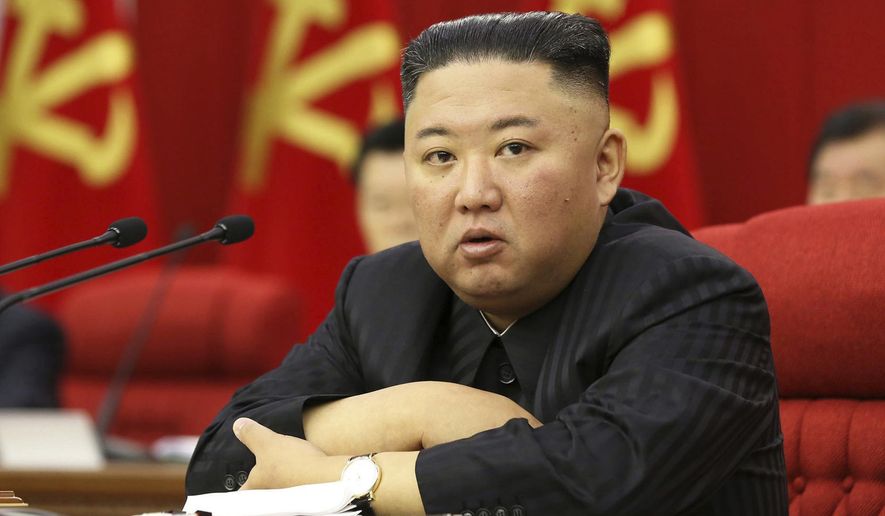OPINION:
Reappearing last month at a Politburo meeting after months out of the public spotlight, North Korean leader Kim Jong Un lambasted party officials for their failure to counter the coronavirus pandemic — even though North Korea has, of course, confirmed not even one COVID-19 case. Seeking a scapegoat for the Hermit Kingdom’s horrific health care system, lack of medical supplies, and a self-imposed blockade, Mr. Kim replaced a number of his senior officials.
U.S. intelligence agencies are on the hook to determine whether Mr. Kim’s visible weight loss (which North Korean state TV’s thought police explained away as the toll endured by a “devoted and hardworking” leader) might be indicative of a serious, potentially incapacitating illness. A diminutive chain-smoker reportedly weighing over 300 pounds, Mr. Kim, medically speaking, is a ticking time bomb.
Mr. Kim’s health status is a critically important data point because his children are too young to succeed him. A paranoid, ruthless dictator who assassinated his half-brother with a chemical nerve agent in Malaysia’s international airport, Mr. Kim has no clear succession plan. His lengthy disappearance from public view in 2020 even sparked speculation (unconfirmed) that he had made his younger sister, Kim Yo Jong, his de facto second-in-command.
Mr. Kim’s totalitarian regime would not exist without a ruthless suppression of the rights of his own people. The catch-22 is that Mr. Kim likely fears that a prosperous North Korea open to the outside world will lead to public pressure for a free society and democratic reforms. Even as they seek to project an outward appearance of strength, autocratic regimes like Mr. Kim’s are inherently brittle and decrepit. Their vulnerability is exposed when citizens lose their fear of protesting and revolt, especially during a period of great crisis.
Mr. Kim likely has drawn historical lessons from two fallen autocrats.
There’s the specter of the last leader of the Soviet Union, Mikhail Gorbachev, whose policy of openness — “glasnost” — washed away the populace’s fear of their government, a nightmare scenario for Communist fellow traveler like Mr. Kim. After a failed KGB coup, the Soviet Union collapsed, and Mr. Gorbachev was soon out of power.
And there’s Libyan dictator Moammar Gadhafi, who rolled back his weapons of mass destruction programs in a deal with Britain and the U.S. When civil war subsequently erupted, Mr. Gadhafi had no capability to deter NATO involvement on the side of his opponents, who killed him near his birthplace. Without a nuclear deterrent, Mr. Kim would likely be staring at the same fate as Libya’s late strongman.
The Biden administration must be prepared for Mr. Kim’s regime to collapse entirely and, with it, control over North Korea’s nuclear, biological, and chemical weapons.
But Washington should also challenge the assumptions on which denuclearization talks with Pyongyang have been based. It strains logic to believe that Mr. Kim would develop a vast and expensive nuclear and ballistic missile capability only to barter it away for food, more energy imports, and a constructive relationship with the world community. North Korea has never indicated a willingness to provide an inventory of its nuclear weapons or agreed to a realistic plan for their destruction.
North Korea has multiple nuclear sites, including the sprawling Yongbyon complex, where plutonium production and uranium enrichment occur; the Sohae satellite facility used to test ballistic missiles; and the Punge-ri nuclear site. Arms control experts estimate it would take years to dismantle Yongbyon, which reportedly has 10 nuclear research institutes and approximately 400 buildings.
Mr. Kim has always sought to give up as little as possible in return for as much sanctions relief as he can obtain. If North Korea never agrees to full denuclearization, then the U.S. needs to consider an arms control regime, which allows for inspections, reduces stockpiles, and limits testing to prevent additional technological advances.
After U.S. special envoy Sung Kim’s recent conversation with his Chinese counterpart, Beijing, which has flagrantly enabled North Korea to evade U.N. sanctions, publicly assured Mr. Kim of its ongoing support and reaffirmed the countries’ 60- year bilateral defense treaty. Having purposely rebuffed U.S. proposals for negotiations without preconditions, Mr. Kim is following the same playbook as he did in the lead-up to the Singapore summit, when he met with Chinese President Xi Jinping and Russian Foreign Minister Sergey Lavrov before sitting down to talks with President Trump.
Mr. Kim may soon conclude that the gravity of North Korea’s economic and health crises compel him to force the U.S. to deal with him now, perhaps by conducting an ICBM or nuclear test designed to engineer a “crisis” which only Mr. Kim could de-escalate — on his own terms. But for now, notwithstanding whatever health issues may have afflicted him, Mr. Kim is effectively practicing Pyongyang’s version of “strategic patience,” willing to relinquish some strategic independence to China in return for a stronger negotiating position against Washington.
• Daniel N. Hoffman is a retired clandestine services officer and former chief of station with the Central Intelligence Agency. His combined 30 years of government service included high-level overseas and domestic positions at the CIA. He has been a Fox News contributor since May 2018. Follow him on Twitter @DanielHoffmanDC.




Please read our comment policy before commenting.